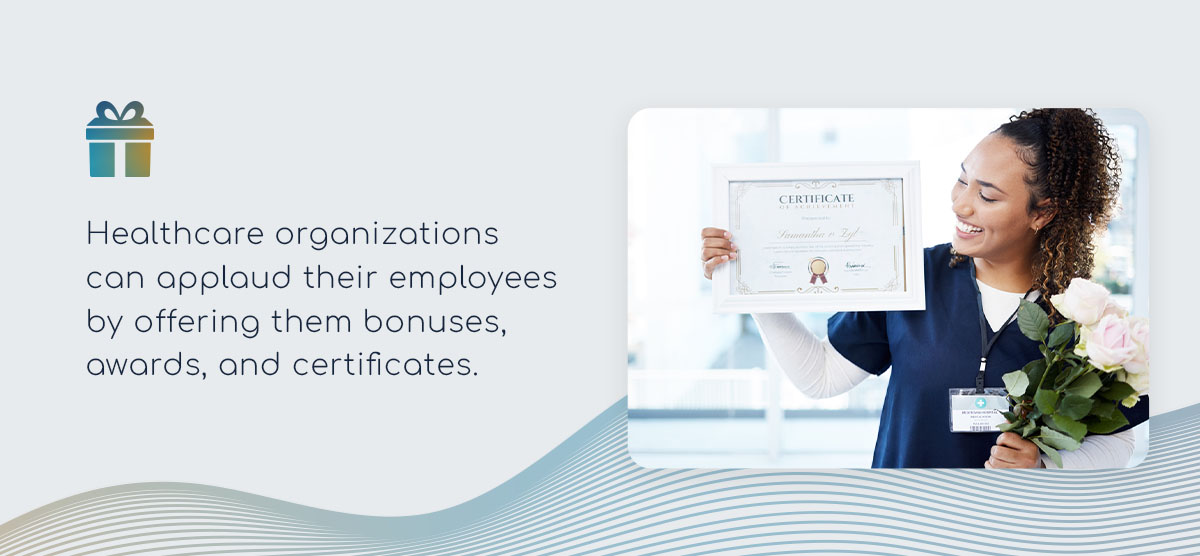Employee engagement is often confused with satisfaction. However, engagement refers to the level of an employee’s connection and commitment to the organization’s mission and values. Engaged healthcare employees feel a sense of purpose in their role at the facility, which may positively impact their satisfaction, happiness, and service delivery.
Healthcare employees may feel disengaged for many reasons, including working in a high-stress environment, a lack of work-life balance, and burnout. Equally, healthcare facilities can take numerous steps to increase employee engagement, reaping the benefits impacting their patients, staff, and profitability.
Below, we cover five effective strategies to boost staff engagement and retention in healthcare centers.
The Importance of Engaged Staff in Healthcare Settings
Engaged healthcare employees are passionate, committed, and dedicated to the organizations they work in and the patients they serve. They provide higher-quality care, which improves patient satisfaction and safety and reduces accidents on the job. These employees communicate with patients with genuine smiles, exhaustively address concerns, and express care and support.
Satisfactory employee engagement rates can also help build and maintain a practice’s reputation by increasing healthcare employee retention rates and boosting the hospital’s ratings. Having many engaged healthcare employees helps create a harmonious, collaborative, and positive work environment. A comprehensive 2023 Gallup study found that highly engaged employees are 17% more productive, and their employing facilities see a 23% spike in profitability.
How to Improve Employee Engagement in Healthcare
Improving staff engagement in healthcare involves creating a work environment where practitioners feel confident and passionate about their roles. The following steps prove helpful in creating an engaged healthcare workforce.
1. Fostering a Positive Work Culture and Environment
Cultivating a positive work environment involves creating an inclusive and supportive workplace for staff. It starts with hiring the right candidates who believe in and constantly work toward the organization’s purpose, mission, vision, and values. The organization should ensure all leaders and members strive for these daily.
Here are some ways to strengthen a healthcare work culture and create a positive environment for more engaged employees:
- Demonstrate empathetic, fair, and transparent leadership.
- Communicate clear expectations for every employee’s role to mitigate conflicts and misunderstandings.
- Maintain an ideal patient-to-safety ratio.
- Encourage collaboration among team members.
- Establish and implement inclusion and diversity initiatives.
Prioritizing staff and patient safety and well-being is crucial for fostering a positive work environment. Establishing workplace safety involves communicating accident prevention protocols and setting up solid reporting procedures for potential risks and hazards. In addition, it protects healthcare employees’ wellness by creating robust mental health support systems and enforcing a zero-tolerance system.
2. Offering Professional Development Opportunities
By providing staff with numerous learning and professional development opportunities, organizations can boost engagement and reduce employee turnover in healthcare. Studies show that healthcare employees continually search for learning and professional development opportunities to advance their careers, increase their job satisfaction, and improve the quality of patient care.
Ongoing job training and leadership courses are among the most popular ways to help disengaged healthcare employees develop new skills and enhance their current skill sets. Other professional development opportunities that can boost engagement include:
- Work exchanges.
- Internal promotions.
- Travel opportunities.
- Employee-led workshops and informal training sessions.
- Skill exchange days.
- Seminars and conferences.
- Mentorship programs.
3. Recognizing and Rewarding Achievements
Recognition is a crucial tool for boosting engagement and motivating healthcare staff. It makes them feel valued and appreciated for their contributions to the organization’s success.
Establishing employee recognition programs fosters a culture where peers recognize and appreciate each other. These programs enable employees to cheer on their peers for their hard work, spotlight heroic actions, and highlight personal and professional achievements. Additionally, healthcare facilities can implement peer nomination programs where workers acknowledge their peers for excellent leadership, continued support, and exemplary innovations.
Formal recognition programs, such as award ceremonies, are ideal for celebrating accomplishments and rewarding teams and individuals. Healthcare organizations can applaud their employees by offering them bonuses, awards, and certificates. An effective and sustainable formal recognition program focuses on employees’ needs. Therefore, these rewards must be relevant and meaningful to the staff.

Furthermore, reward and recognition strategies must evolve over time to meet the changing needs of health workers. Medical facilities can ensure this by requesting regular feedback from employees to understand and satisfactorily cater to their needs.
4. Encouraging Open Communication Channels
An open-door communication policy in medical practices allows employees access to managers and other leaders, encouraging them to share ideas and discuss their major concerns. Open and honest communication with an organization’s leaders also promotes trust and cooperation, as employees can share their opinions and feelings without fear or retribution.
Encouraging interdepartmental teams of nurses, laboratory technicians, physicists, and physicians also helps foster a collaborative culture in medical practices. Additionally, it builds strong social connections among employees, providing them with a sense of belonging and boosting their engagement.
Inviting employees to share feedback through focus groups and surveys is key to helping organizations identify growth and improvement opportunities. These efforts can especially help identify and address barriers to employee engagement, such as inclusion, equity, and belonging.
5. Providing Healthcare Staff With Flexible Work Options
Healthcare professionals often work long hours in high-stress environments, which may make them feel disengaged. Employers can motivate their employees and boost their engagement by offering them flexible work schedules. These schedules allow staff to achieve a better work-life balance. They also demonstrate the organization’s commitment to employees’ health and safety.
To implement flexible work options, healthcare facilities can allow employees more freedom in scheduling their work days and hours. Doing so minimizes their need to work irregularly long hours and enables them time to fulfill their personal needs and responsibilities. Employing a hybrid work environment where healthcare professionals can perform some roles remotely, such as healthcare consultations and administrative tasks, may also lead to happier, more productive, and engaged staff.
Maximize Your Staff’s Potential by Engaging a Healthcare Management Consultant
While it’s possible to implement the above tips to boost your healthcare employees’ engagement, you can achieve higher margins of success by working with a healthcare management consultant. These experts aim to help healthcare facilities improve their profitability, quality of patient care, and regulatory compliance.
DoctorsManagement, LLC is a reliable, full-service consulting firm focused on simplifying the business of medicine. Our team includes expert management consultants who work with your staff to identify inefficiencies and causes of disengagement. We then develop and implement policies and procedures that keep them committed, engaged, and passionate throughout their tenure.
Additionally, we help organizations maintain compliance with regulatory standards, such as OSHA and HIPAA. Our healthcare compliance services also include:
- Coding and billing training.
- Laboratory compliance (CLIA).
- Compliance officer training.
- Healthcare compliance audit preparation.
- Coding and documentation analysis.
- Audit appeal and defense.
Please contact us today if you have questions about our services or would like to schedule a free consultation.

























